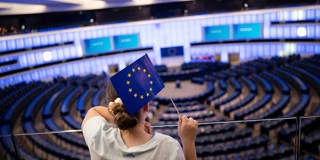There is a remarkable degree of expert consensus on how to address the competitiveness, security, and energy crises confronting the European Union. But implementing these reforms will require European leaders to overcome the inertia that prevails among member states.
PARIS – The European Union is facing three major crises. The first is a competitiveness crisis that was already apparent in the late 2010s but has worsened, leading to lackluster productivity and growth performance. More recently, Russia’s invasion of Ukraine created a security crisis that is compounded by the bloc’s deteriorating relationship with China. The war also triggered an energy crisis that puts Europe at a disadvantage relative to its major competitors, the United States and China.

PARIS – The European Union is facing three major crises. The first is a competitiveness crisis that was already apparent in the late 2010s but has worsened, leading to lackluster productivity and growth performance. More recently, Russia’s invasion of Ukraine created a security crisis that is compounded by the bloc’s deteriorating relationship with China. The war also triggered an energy crisis that puts Europe at a disadvantage relative to its major competitors, the United States and China.